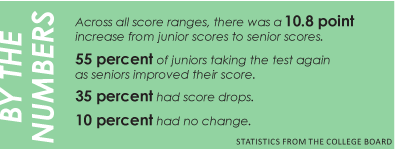
As the school year begins, juniors and seniors are at very different points in planning for their futures. Whereas juniors are just beginning on the long trek that is the college process, seniors are starting down the final stretch. Yet increasingly, these two paths are crossing at one crucial point: standardized testing. Both juniors and seniors are sitting down this fall to take the ACT or SAT, though with goals and incentives varying between the two grades.
“Hopefully, I’ll be able to get it out of the way and not have to focus on it later,” said Melissa Beretta ’14 of the ACT, echoing a popular sentiment among junior test takers. Beretta took an ACT for the first time in April of her sophomore year and again on September 8. “You have an unlimited amount of times to take it, so why not try it early on?” Beretta added.
Alec Maki ’13, who also took the September ACT, offers a similar explanation.
“This was my fourth ACT. I thought I could do better, so I might as well just see what happens,” said Maki.
This mindset is promoted by the many options available when reporting scores. Both score choice from the College Board, which allows students to choose only their best score to report to colleges, and super scoring on the Common Application, which picks the highest score on each individual section of the ACT or SAT, increase the possible benefit of retaking standardized tests.
However, Elaine Schwartz, Director of Guidance at Staples, advises against taking standardized tests too many times.
“If you take it too many times it doesn’t change your score all that much,” Schwartz said. “You tend to plateau.”
According to a 2009 study conducted by the National Association for College Admission Counseling, a group that represents the interests of private and public guidance counselors, more than one third of the postsecondary institutions surveyed said that an increase of only 10 or 20 points on the SAT would “significantly improve a student’s likelihood of admission.”
Such statistics serve as an incentive for Staples students to test early and often.
“I was almost mad at my parents that I didn’t start earlier,” said Zoe Cohen ’13, who took her first college entrance exam December of junior year, and took another this September. “I wanted to be done with it.”
Westport Educational Consultant J. Yoon also supports standardized testing earlier on.
“One of the reasons I like my students to take it junior year is to avoid the pressure of senior year,” Yoon said.
Pressure, which, both Cohen and Maki agree, is compounded with the addition of filling out applications, maintaining high GPA’s, and many other tasks keeping seniors busy this time of year.
However, Cohen also cites several advantages to testing senior year, including having more courses under her belt and more experience in standardized testing.
Nathan Allen, President of Andover College Preparatory Inc, sees such advantages helping specifically with the ACT. Allen says that whereas the SAT is a “bastardized IQ test,” the ACT is more content based, similar to many statewide assessments, thus it is important to be comfortable with the content covered on the test before taking it.
As for the SAT, Allen says that taking it junior or senior year is “irrelevant,” and rather places importance on the specific month in which the test is taken.
“I strongly recommend taking released tests, which are in October, January, or March,” Allen said. “They don’t try anything new on released tests. And if anything goes wrong you can find out why.”
Schwartz, Yoon, and Allen all acknowledge that ultimately, it is up to the individual.
“None of this happens in a vacuum,” said Allen, who advises students to plan out their time and figure out which test date works best with their individual schedule.
Furthermore, Schwartz urges students to remember that college entry exams are not the be all and end all for juniors or seniors.
“SATs and ACTs are only on small part of a student’s entire portfolio,” said Schwartz. “Students have options. A lot of schools no longer need SATs or ACTS for admittance. Just do the best you can. It’s only one piece.”












































